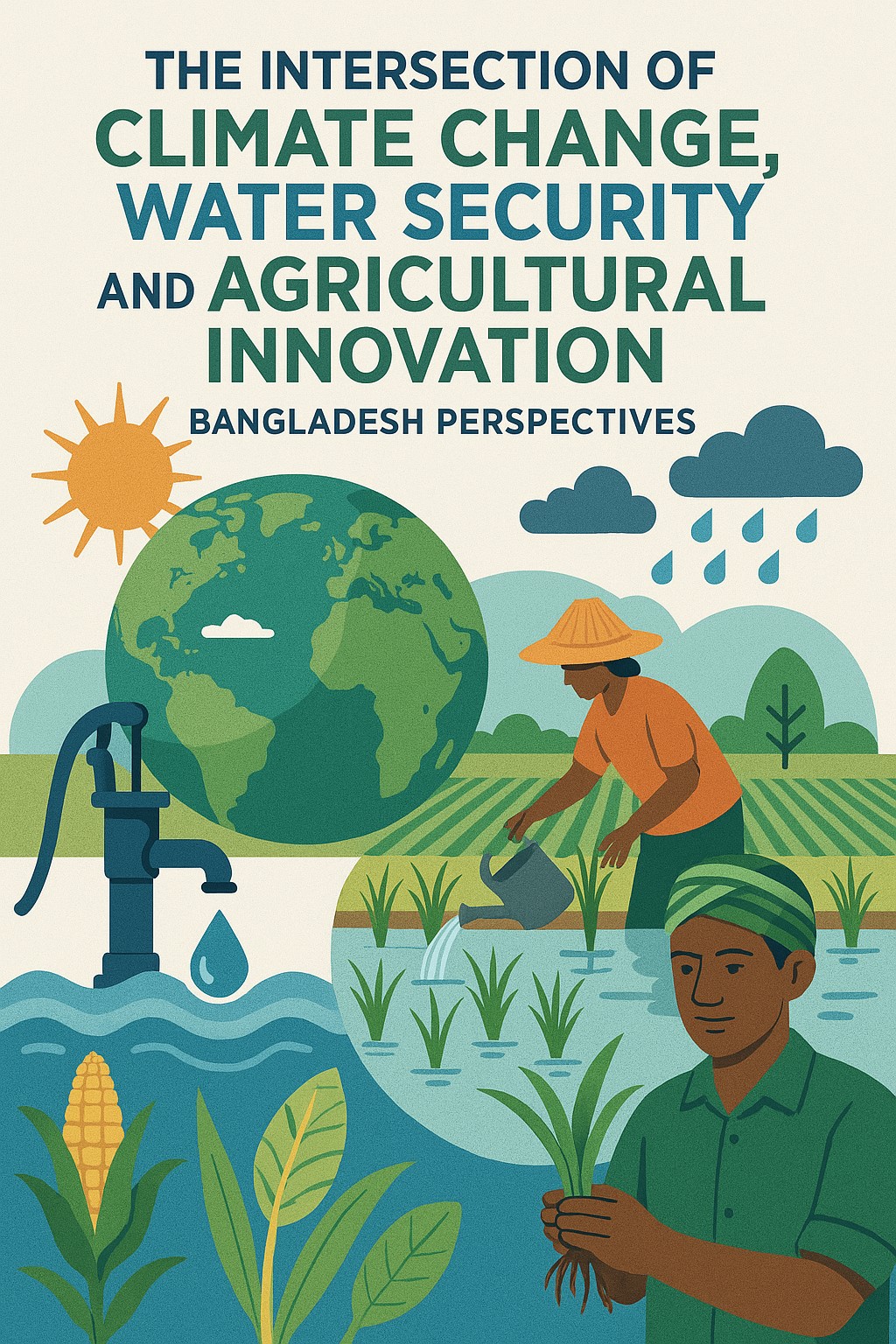
The Intersection of Climate Change, Water Security and Agricultural Innovation: Bangladesh Perspectives
Title
The Intersection of Climate Change, Water Security and Agricultural Innovation: Bangladesh Perspectives
Author
1. Ashim Saha, Other, NETZ Partnership for Development and Justice, Bangladesh
Abstract
This study investigates the
interconnected challenges of climate change, water security and agricultural
innovation in rural Bangladesh. Using a mixed-method cross-sectional design,
including interviews and case studies across five districts, the research
reveals that while farmers demonstrate moderate awareness of climate change,
they remain highly vulnerable to its consequences—particularly water scarcity,
shifting weather patterns and declining agricultural productivity. Compared to
many developing nations facing similar issues, Bangladesh presents a unique
case where densely populated rural areas and dependence on traditional farming
methods intensify the risks. Despite some awareness, farmers often lack the
resources, institutional support and training needed to adopt adaptive
practices. In contrast, countries with stronger policy frameworks and
investment in rural education and technology have shown better outcomes in
adopting climate-resilient agriculture. Water conservation techniques and
climate-smart agricultural innovations remain underutilized in Bangladesh,
largely due to financial constraints, limited market access and inadequate
extension services. The study emphasizes that meaningful progress requires more
than awareness, it demands structural changes, improved governance and
international collaboration. By comparing Bangladesh’s current strategies to
more progressive models in similar agro-ecological zones, the study underscores
the importance of integrating climate resilience into national agricultural
policy. It recommends enhancing farmer access to technology, expanding training
programs and encouraging public-private partnerships to scale innovation.
Bridging the gap between knowledge and practice is essential to safeguarding
food security and rural livelihoods in the face of accelerating climate
threats.
Keywords
Conclusion
The
intersection of climate change, water security and agricultural innovation
presents both significant challenges and opportunities. As the global community
grapples with the realities of a shifting climate, the demand for innovative
solutions to secure sustainable agricultural practices and reliable water
resources becomes increasingly urgent. Bangladesh, with its unique
vulnerabilities and innovative responses, provides valuable insights into
resilience and adaptation. Through fostering collaboration, investing in
research and embracing new technologies, both locally and globally, we can
create pathways toward a future where agriculture continues to thrive despite
the challenges posed by climate change and water scarcity. This approach not
only protects food security but also enhances the livelihoods of millions of
farmers worldwide.
This
study highlights the critical challenges faced by rural Bangladesh in relation
to climate change, water scarcity and agricultural productivity. While there is
a moderate understanding of climate change among farmers, many continue to face
inadequate resources, frequent water shortages and limited adoption of
sustainable farming practices. Although government policies offer some support,
they are widely regarded as insufficient to address the scale of the problem.
The findings suggest that climate change is having a substantial impact on
agricultural production and both immediate and long-term solutions are
necessary to ensure food security and sustainability in these vulnerable
regions.
Recommendations:
· Enhance training and awareness
programs for farmers to improve knowledge on climate change impacts and
water-efficient practices
· Government policies should focus on
providing financial incentives, subsidies for climate-smart technologies and
improving water management infrastructure
· Encourage the adoption of water
conservation techniques like rainwater harvesting and the use of
drought-resistant crop varieties through grants and technical support
· Support research on
climate-resilient agricultural technologies and encourage the development of
affordable innovations for farmers
· Strengthen international
partnerships to share knowledge, technologies and resources for combating
climate change and ensuring water security in agriculture.
Author Contrubution
Ashim Kumar Saha made significant contributions to this study. He conducted research, developed the manuscript and designed the study. Additionally, he formatted the manuscript according to the journal guidelines. The respective author collaborated on interpreting the results and ensuring the manuscript was written precisely.
Funding
This research was conducted without any external funding. The authors voluntarily and independently carried out the study.
Conflict of Interest
The authors declare that they have no competing interests associated with this study.
Data Sharing Statement
Depends upon on request and regarding informed consent through considering confidentiality maintain for the reader
Software And Tools Use
SPSS-24 and Kobo Collect Online Apps
Acknowledgements
This cross-sectional mixed-method study was conducted by Ashim Kumar Saha. The data collection for this report was supported by a dedicated team of researchers from the NETZ Bangladesh Livelihood Programme, escorted by PM SK Zakir Hossain and partners from the PORIBESH Project. Special thanks go to Kazi Masudur Rahman (PM, POLLISREE), Babor Ali (DC, DASCOH Foundation), Masum Billah (DC, BARCIK) and Rashedul Islam (DC, MJSKS). We sincerely thank the entire research team for their hard work and enthusiastic contribution to the study in the field areas.
Corresponding Author
Copyright
Copyright: ©2026 Corresponding Author. This is an open access article distributed under the terms of the Creative Commons Attribution License , which permits unrestricted use, distribution, and reproduction in any medium, provided the original author and source are credited.
Saha, Ashim. “The Intersection of Climate Change, Water Security and Agricultural Innovation: Bangladesh Perspectives.” Scientific Research Journal of Arts, Humanities and Social Science, vol. 3, no. 1, 2025, pp. 8-29, https://isrdo.org/journal/SRJAHS/currentissue/the-intersection-of-climate-change-water-security-and-agricultural-innovation-bangladesh-perspectives-1
Saha, A. (2025). The Intersection of Climate Change, Water Security and Agricultural Innovation: Bangladesh Perspectives. Scientific Research Journal of Arts, Humanities and Social Science, 3(1), 8-29. https://isrdo.org/journal/SRJAHS/currentissue/the-intersection-of-climate-change-water-security-and-agricultural-innovation-bangladesh-perspectives-1
Saha Ashim, The Intersection of Climate Change, Water Security and Agricultural Innovation: Bangladesh Perspectives, Scientific Research Journal of Arts, Humanities and Social Science 3, no. 1(2025): 8-29, https://isrdo.org/journal/SRJAHS/currentissue/the-intersection-of-climate-change-water-security-and-agricultural-innovation-bangladesh-perspectives-1
8663
Total words2535
Unique Words389
Sentence21.984575835476
Avg Sentence Length0.29826382557745
Subjectivity0.032871725889078
PolarityText Statistics
Viewed / Downloads
Total article views: 311 (including HTML, PDF, and XML)| HTML | XML | Total | |
|---|---|---|---|
| 220 | 46 | 45 | 311 |
Viewed (geographical distribution)
Thereof 311 with geography defined and 0 with unknown origin.
